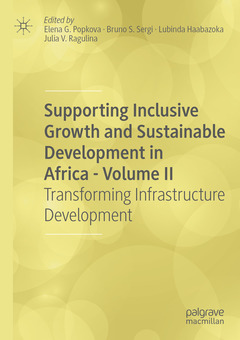Supporting Inclusive Growth and Sustainable Development in Africa - Volume II, 1st ed. 2020 Transforming Infrastructure Development
Coordonnateurs : Popkova Elena G., Sergi Bruno S., Haabazoka Lubinda, Ragulina Julia V.

Part I Transforming Infrastructure Development .- 1. Corporate Governance in South Africa: A Comparative Aspect.- 2. Hi-Tech Development of Modern Africa: Opportunities and Barriers.- 3. Information Society, Telecommunication Infrastructure, and Digital Entrepreneurship in Modern Africa.- 4. The Impact of Obsolescence on Public-Private Partnership Projects in South Africa.- 5. The Strategic Benefits of Innovation Adoption in Construction Consultancy Firms: The Role of Quantity Surveyors.- 6. Factors Affecting Effective Infrastructure Service Delivery in Zambia’s Local Authorities: A Case of Eastern Province.- 7. Adoption Level of FAO’s Valuation Guidelines in Nigeria.- 8. An Empirical Analysis of Transportation Infrastructure Feasibility Study Considerations.- 9. Smart Tourism for Enhancing Tourism Experience: Prospects and Challenges for Africa.- Part II Inclusive Economic Growth.- 10. Women’s Entrepreneurship and Sustainable Livelihoods in Lusaka Urban.- 11. AfricanUnion Outer Space Program: Chances and Challenges.- 12. The Malabo Protocol on African Criminal Court: Challenges and Perspectives.- 13. Integration in Africa: International Legal Competence of the East African Community in the Economic, Social and Cultural Sphere.- Part III Economic Diversification and Integration- 14. Framework for Attracting Traffic Back to the Railways in Zambia.- 15. Planning and Designing Standard of Rural Road Construction in Lusaka Province: An Exploratory Study.- 16. International Listed Real Estate Market Portfolio Diversification in BRICS.- 17. Migration Trends in Sub-Saharan Africa-Domestic and International Socio-Politico-Economic Repercussions: Implications for Zambia.- 18. Scenario of Modern Africa’s Development Until 2030 with Preservation of the Pre-Digital Technological Mode.- 19. Africa 4.0 as a Perspective Scenario for Neo-Industrialization in the Twenty-First Century: Global Competitiveness and Sustainable Development.- 20. Africa 4.0 as the Optimal Model of Development of the African Region of the Global Economic System Until 2030.- 21. Future Perspectives of Inclusive Growth of the African Economy.
Elena G. Popkova is Leading Researcher at Moscow State Institute of International Relations (MGIMO) and Plekhanov Russian University of Economics, and the President of the Institute of Scientific Communications, Russia. She has guest edited for a number of international journals and remains on the editorial board for several more journals.
Bruno S. Sergi is Instructor of the Economics of Emerging Markets and the Political Economy of Russia and China at Harvard University, USA. He is also an Associate of the Harvard's Davis Center for Russian and Eurasian Studies and the Harvard Ukrainian Research Institute, and teaches Political Economy and International Finance at the University of Messina. Sergi is the Series Editor of Cambridge Elements in the Economics of Emerging Markets, the Series Editor of Entrepreneurship and Global Economic Growth, and an Associate Editor of The American Economist.Lubinda Haabazoka is Directorat the University of Zambia’s Graduate School of Business and President of the Economics Association of Zambia, Zambia. He served as Head of the Accounting and Finance Department at the Copperbelt University in Zambia from 2012 to 2016.
Julia V. Ragulina is Head of the Chair of Compliance and Controlling at RUDN University, Russia. She is the author of more than 200 publications, including monographs on state control and audit, state and municipal management, and economics of municipal entities.Date de parution : 10-2021
Ouvrage de 317 p.
14.8x21 cm
Date de parution : 10-2020
Ouvrage de 317 p.
14.8x21 cm



